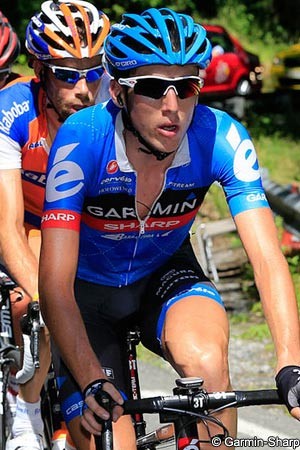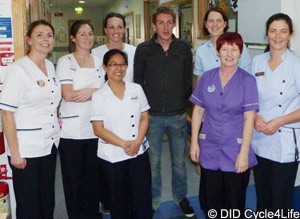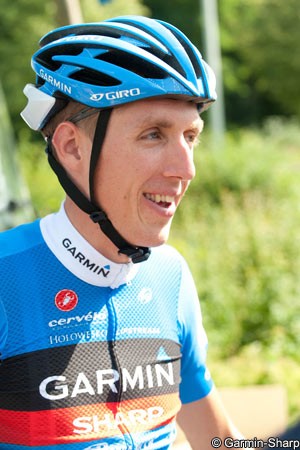Irishman busy during time off bike
 Encouraged by sixth and fifth places respectively in Flèche Wallonne and Liège-Bastogne-Liège, Dan Martin is focussed on returning to the Ardennes Classics next spring, continuing his year-on-year progression and landing a podium finish in at least one of those races.
Encouraged by sixth and fifth places respectively in Flèche Wallonne and Liège-Bastogne-Liège, Dan Martin is focussed on returning to the Ardennes Classics next spring, continuing his year-on-year progression and landing a podium finish in at least one of those races.
The Garmin-Sharp climber was one of the strongest riders in the finale of both Classics. He was badly placed heading onto the Mur de Huy but passed many riders and clocked up sixth place; several days later, he attacked in the finale of Liège, but was reeled in by the group behind and had to settle for fifth.
Still, both races showed that he has the potential to aim for the win in another couple of years. Before then, though, Martin sees the podium as a logical step for 2013, and regards that goal as the first big target of next season.
“I got a lot of confidence this year from the Ardennes, especially when I look back and consider that I didn’t have the best preparation with my crash in Catalunya,” he told VeloNation. “I didn’t realise at the time how much it took out of me. I don’t think I was at 100 percent of what I could have been at the Ardennes, but I still managed a very strong performance.
“It was the first time I had ever done a good performance in the Ardennes. Those results gives me a lot of confidence for next year, and it gives the team confidence to ride for me as well. It also gives me more incentive to train hard and really put focus on those races, believing that I can be a contender.”
Martin finished second in the 2011 Il Lombardia and was also second this year in the Japan Cup plus on a stage of the Tour of Beijing. He’s won big races in the past, but feels he needs to bide his time for the Ardennes races.
“It is baby steps all the time,” he answered, when asked if he could reach the line first next spring. “I think there has been a slow, natural progression in my career thus far. I think the first aim will be to try to make a podium in one of those three races. Obviously I got pretty close this year, so that is a bit more realistic than trying to actually win the race.
“Obviously you can have a fantastic day one day and if you get a bit lucky, you can definitely come out on top, but for now I will be aiming to just replicate what I did last year, and maybe go a bit better.”
End of season break, and Cycle4Life charity:
Martin is currently back home in Girona, having had a later end to the season than most. He raced the Tour of Beijing, where he was second and sixth on stages, fourth overall and won the mountains competition, then at the beginning of this month went to Ireland in connection with the DID Cycle4Live charity. A ride organised by it earlier this year raised an impressive €126,884 for the Temple Street Children’s hospital. After a Q&A session with fans on November 1st, he visited the hospital the following day to see how the money was spent.
 He was clearly moved by the experience. “It was incredible to see the effects the fundraising had and it made me even more motivated for next year,” he said. “I felt very privileged to be able to put my name towards such a good cause and to be associated with Temple Street.
He was clearly moved by the experience. “It was incredible to see the effects the fundraising had and it made me even more motivated for next year,” he said. “I felt very privileged to be able to put my name towards such a good cause and to be associated with Temple Street.
“I myself was five weeks premature and when I was born, I had to spend a week in hospital on an incubator. So to go into the ICU and see a premature baby being kept alive by machine that has a plaque on it thanking the DID Electical Cycle4Life charity for supplying the machine was something else. It really did hit home that once that was me in that situation.”
Martin takes encouragement from the fact that the shared history with children in that situation could be an example. “It is nice to think that perhaps my story could encourage those kids who have had unfortunate starts to their lives to really aim for the top. That it might show them that I was still able to get to where I am now after such a rough start to life.”
The 26 year old got out on his bike this week, but that it didn’t mark a return to training. He points out that as he kept racing late in the season, he is just a couple of weeks into his winter break while other riders who stopped sooner are already back in training.
“A nice thing about when you make your season longer is that you can have time off pretty late in the year and it makes the winter shorter,” he said. “It’s nice to have a real mental break, not having to get changed every day, not having to get into your gear and stuff. I did a ride yesterday, it is beautiful down here…it is 20 degrees, so I just went out with my dad [former pro Neil Martin – ed.]. But other than that, I am trying to stay off the bike at the moment.
“I am hectic busy, just doing all the stuff you don’t get done when you are away from home. Now is also the time to get the body right after the season. I saw the chiropractor today, I have a dentist appointment on Monday to get my wisdom teeth out. All stuff that you can’t get done during the season. You might not be on the bike now, but taking care of those things is also part of being a pro.”
The way forward after USADA shockwaves:
Asked about the recent Armstrong/US Postal Service case and where that leaves the sport, Martin echoes other professionals who believe that things are much better than they were years ago. However he also proposes ways that the sport can move forward and make it less likely for such coordinated cheating to happen in the future.
 “Longer sanctioning could work well…it would be more of a deterrent that the system at the moment,” he said. “Some guys might take risks, especially if they are coming to the end of the season and don’t have a contract for the following year. However if they have the deterrent that they can never come back, then it is more serious.”
“Longer sanctioning could work well…it would be more of a deterrent that the system at the moment,” he said. “Some guys might take risks, especially if they are coming to the end of the season and don’t have a contract for the following year. However if they have the deterrent that they can never come back, then it is more serious.”
He believes that ramping up the penalties would also be of value in terms of the bigger picture. “I think it is very important now that we set up a very harsh stance to prove to the rest of the world that cycling is serious. I do believe it is one of the cleanest sports in the world because of the amount of testing we go through.”
He’s aware that cycling’s reputation has taken a knock, both from the Armstrong case and also the positive tests that occur each year. However he points out that other sports which don’t have any positives are often the same ones who don’t have regular controls. “The facts are if you test more people, you are going to find more people cheating,” he said. “The system is a victim of its own success, in reality.”
“I have developed quite a clean replication in the peloton and I am very, very proud of that. Obviously with the way the passport works, they get a history of your blood values, and it allows you to see the guys you can believe in. Then you can go and target other guys.
“The passport isn’t really used to get guys positive. It is used to find guys who may be a bit suspicious and then they can test the hell out of those guys. That is why there are more positives in cycling, effectively, because they are actually testing the guys who they believe could be up to no good.’
Martin states that negative headlines about the sport can be frustrating for riders, in that it puts cycling in a spotlight that other sports essentially avoid through inaction. “It is annoying, this assumption that if you are a cyclist that you could be a doper, yet footballers don’t have that association between drug taking and the sport. Obviously the lack of testing in those sports…I dare say the lack of positives is because they don’t test as much.
“The problem is in every sport, and especially when there is so much money involved. People are desperate to win. The stakes are so high now that of course there are always going to be individuals who try to bend the rules. But in terms of what can be done, I think that the targeted testing is definitely becoming more effective.”
Several of Martin’s Garmin-Sharp team-mates admitted using banned substances while with the US Postal Service/Discovery Channel setup. Christian Vande Velde, Dave Zabriskie and Tom Danielson are current suspended, but should be able to race again next spring due to six month bans which began in September.
The repercussions of the Armstrong case will rumble on longer than that, though, with the UCI due to undergo an independent review, and with many calling for a complete separation of the policing and promotion roles.
When asked about whether he agrees with an independent body taking over anti-doping, Martin sees the benefits. “There are two arguments; one is that the UCI understands cycling, but their motive is what is in the best interests in the sport. But I think it could be good. It definitely could be a positive to have an independent company or association doing the testing,” he said.
“Maybe someone like the IOC could look at doing it for all sports. Maybe creating an equality between the Olympic sports, as again it comes back to this disparity of the amount of and quality of testing between the different sports.
“Wherever there is professional sport, and there is a lot of money involved as far as sponsorship and other issues, there is always the risk of corruption. Whatever the association is that is doing it, it is always going to be difficult to stop corruption. That is a problem. But if it is done right, it could be possible. It would be very positive to have that aspect independent.”